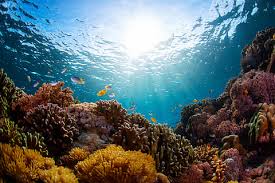UNESCO Launches Ocean Coordination Mechanism for Marine Conservation
Current Affairs International IssuesPosted by newadmin on 2025-02-03 08:40:21 |
Share: Facebook | Twitter | Whatsapp | Linkedin Visits: 26

The Intergovernmental Oceanographic Commission of UNESCO has launched the Ocean Coordination Mechanism (OCM) to address critical challenges affecting marine environments in the Caribbean and the North Brazil Shelf. These regions are essential for biodiversity, local economies, and climate resilience, and the OCM seeks to enhance the management of shared ocean resources through collaboration and well-defined objectives.
Oceans, covering over 70% of the Earth's surface, play a crucial role in regulating climate and supporting billions of livelihoods. They are essential for biodiversity, fisheries, and coastal communities, while also mitigating the impacts of climate change and providing vital resources for human sustenance. However, marine ecosystems face severe threats from pollution, overfishing, climate change, and habitat destruction. These environmental challenges endanger marine life and jeopardize the well-being of communities dependent on ocean resources. Effective coordination and management are necessary to combat these threats and ensure the sustainable use of marine ecosystems.
The Ocean Coordination Mechanism builds on lessons learned from previous initiatives like the Pacific Islands Regional Ocean Policy. It aims to set clear objectives for the sustainable management of marine resources while fostering collaboration among stakeholders to create an inclusive approach to ocean conservation. Financial sustainability is a key aspect of the initiative, with the OCM securing an initial investment of $15 million from the Global Environment Facility (GEF), alongside an additional $126.02 million in co-financing. However, concerns remain about whether this funding will be sufficient to achieve the ambitious goals of the initiative, given that other global conservation projects receive significantly larger investments.
A major strength of the OCM is its commitment to involving local communities in conservation efforts. By integrating traditional knowledge with scientific research, the initiative ensures that conservation strategies remain culturally relevant and effective. This approach strengthens marine protection while also fostering local engagement. Additionally, the OCM promotes blue carbon projects, which utilize coastal ecosystems for carbon storage. These initiatives not only contribute to climate change mitigation but also support economic development in coastal areas, benefiting both the environment and the communities that depend on it.
Search
Categories
Recent News
- Prostate Cancer Awareness: A Hospital's Initiative for Early Detection
- India's Data Revolution: AI Infrastructure and Job Creation
- Wildlife Haven Implicated in Madhya Pradesh's Meat Scandal
- Punjab Farmers' Fury: Protesting India's Trade Deal with US
- BJP's Maharashtra Alliance Strategy for Upcoming Local Elections
- BirlaNu's Billion-Rupee Bet on Fibre Cement
- Delhi Roof Collapse Claims Elderly Tenant's Life
- Competition Commission Targets IndiGo: Unfair Practices Under Scrutiny
Popular News
- Navigating IPO Market Dynamics Amid Volatility and Regulatory Changes
- Massive Worldwide Microsoft Outage Disrupts Multiple Sectors
- Panjapur Bus Stand to Reshape TNSTC Routes
- తెలుగుదేశం పార్టీ - పేదరికాన్ని నిర్మూలించడంలో వాగ్దానం
- Universities Embrace Remote Learning Technologies Amidst Ongoing Pandemic